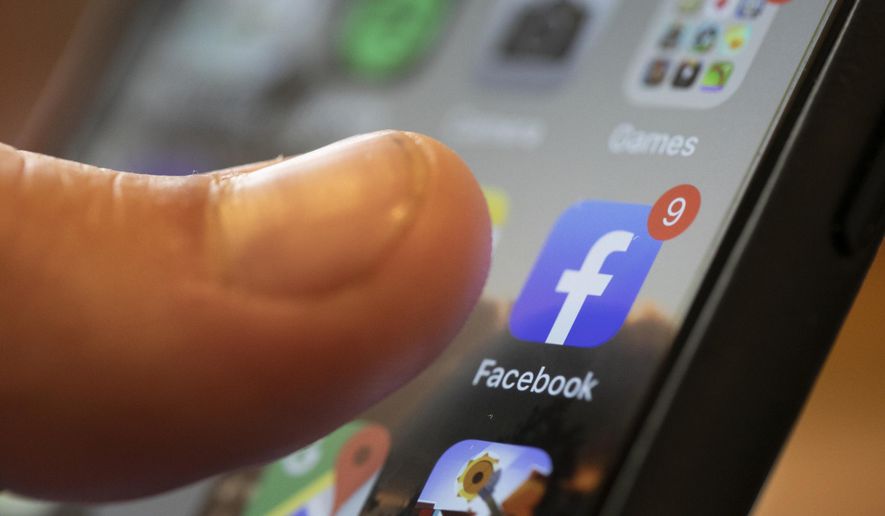Facebook is suppressing “vaccine hesitancy” behind the scenes, limiting the reach of comments that express concerns about COVID-19 inoculations or share negative experiences, even if accurate, according to an investigation released Monday by Project Veritas.
Project Veritas posted a video featuring interviews with two anonymous “insiders” identified as Facebook employees, and produced alleged internal documents detailing the tech platform’s effort to “[d]rastically reduce user exposure to vaccine hesitancy.”
The leaked documents indicate that the tech giant set up a “Vaccine Hesitancy Comment Demotion” tier system run on 1.5% of Facebook and Instagram accounts, which number nearly 3.8 billion worldwide.
“Facebook uses classifiers in their algorithms to determine certain content to be what they call ‘vaccine hesitant,’ what they call ‘vaccine hesitancy,’ and without the user’s knowledge, they assign a score to these comments,” said an “insider” identified as a Data Center Technician. “It’s called a VH score, a vaccine hesitancy score, and based on that score, will demote or leave the comment alone.”
A Facebook spokesperson did not deny the allegations, responding by saying that the policy had been posted.
“We proactively announced this policy on our company blog and also updated our help center with this information,” said the statement provided to The Washington Times.
Under the company’s tier system, according to the insider, comments may be suppressed if they challenge the “narrative” by opposing or questioning the vaccines.
“It doesn’t match the narrative,” the insider said. “The narrative being, get the vaccine, the vaccine is good for you. Everyone should get it. And if you don’t, you will be singled out as an enemy of society.”
Tier 2, described as “Indirect Discouragement,” includes those who promote vaccine alternatives such as herd immunity or share “[p]otentially or actually true events or facts,” such as critical studies or descriptions of their own painful side effects.
“Basically, your comment is going to be suppressed,” said the insider. “As to the scale of that suppression, it’s hard to say. We’ll have to look at it like a case-by-case basis. They call it a ‘position change.’”
Project Veritas President James O’Keefe, who was permanently banned from Twitter in April for allegedly using “fake accounts,” which he denied, noted that Facebook CEO Mark Zuckerberg himself expressed concerns about the “long-term side effects” of vaccines in a July livestream obtained by Veritas.
“Zuckerberg seemed to change his mind, evolve on the issue of vaccines,” Mr. O’Keefe said. “The Facebook policy itself would have prevented Zuckerberg from saying what it is that he had said, just a few months ago. Pretty crazy.”
Project Veritas FB drop is here: https://t.co/C6To9I21zV
— Teresa AnnMarie (@TeresaFreeThink) May 25, 2021
The second Facebook “insider,” identified as a Data Center Engineer, compared the company’s squelching of candid vaccine commentary as “having a relationship with somebody that’s controlling and abusive.”
“It’s the platform that they want to build. It’s the community that they want to build,” the insider said. “They want to build a community where everybody complies, not where people can have open discourse and dialogue about the most personal and private and intimate decisions that anybody could ever face in their life, which is regarding their own body, their own health.”
Facebook announced in March a campaign to help connect people to vaccinations through its apps as part of a partnership with Boston Children’s Hospital, as well as seek to reduce “vaccine misinformation.”
“Building on our goal to promote authoritative information about COVID-19 vaccines, we have implemented several temporary measures to further limit the spread of potentially harmful COVID-19 and vaccine information during the pandemic,” the company said in a March 15 post.
Mr. Zuckerberg tweeted that the “data shows the vaccines are safe and they work. They’re our best hope for getting past this virus and getting back to normal life. I’m looking forward to getting mine, and I hope you are too.”
• Valerie Richardson can be reached at vrichardson@washingtontimes.com.




Please read our comment policy before commenting.